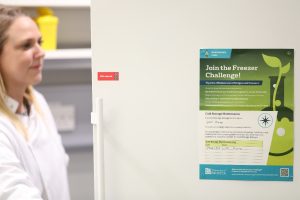The University is committed to reaching carbon neutrality from its buildings by 2030, and departmental Climate Action Plans (CAPs) are integral to achieving this. Each CAP is designed by members of the School or Department, enabling them to pinpoint areas of highest impact. By empowering teams in this way, the Sustainability Team can provide expert support where it’s needed and monitor progress over time.
In January, 26 Schools and Departments submitted plans for an initial review, detailing over 900 committed carbon-saving actions that are either in the pipeline, in progress or complete. Actions are selected under four themes: buildings, circular economy, transport and advocacy, with the online planning tool prompting relevant steps to reduce carbon emissions. The Sustainability Team’s managers for Transport, Energy, Circular Economy and Sustainable Science reviewed each CAP, and provided feedback to enable effective implementation of plans.
Climate Action Plans will now be reviewed annually, and progress recorded and reported to the Sustainability Strategic Monitoring and Implementation Group. With the first round of reviews complete, the Team has a solid benchmark for progress across the University.
Anna Lewis, Sustainable Science Manager, led the review process and said:
“It’s so important to review the Departmental CAPs so that we can provide specialised feedback and offer support for the planned actions over the coming years. Innovative activities and plans are highlighted, which allows for peer learning as well as a consistent approach across the University.”
A recent survey of CAP coordinators has enabled the Sustainability Team to identify new ways to support CAP working groups (or committees, as they’re sometimes referred to). One outcome is to facilitate peer-to-peer learning opportunities, and the Sustainability Team will soon host a session in which coordinators will be able to review other CAPs, share ideas for improvement, and collaborate on future projects.
CAP working groups continue to benefit from bi-monthly CAP Clinics, hosted by the Sustainability Team. These clinics focus around the four themes within the planning tool, but are also a space for coordinators to share any questions or challenges with the wider network.
Overall, 62% of Departments have submitted a Climate Action Plan, with 83% of all Departments successfully engaged in the process. CAPs will continue to be an important resource to help the University achieve its ambitious net zero targets, as well as to continuously demonstrate its commitment to sustainability and climate action for many years to come.
For more information visit the Sustainability website or contact sustainability-comms@bristol.ac.uk.

 STEM buildings are responsible for 40% of the University’s energy consumption, and the numerous freezers in labs contribute to this figure. A single ultra-low temperature freezer (ULT) can use as much energy as an average household each day. Ways to reduce the energy consumption of freezers that were encouraged by the challenge include defrosting freezers, vacuuming freezer coils, creating a cold storage inventory, space sharing, using room temperature storage whenever possible and adjusting ULT temperatures from -80°C to -70°C.
STEM buildings are responsible for 40% of the University’s energy consumption, and the numerous freezers in labs contribute to this figure. A single ultra-low temperature freezer (ULT) can use as much energy as an average household each day. Ways to reduce the energy consumption of freezers that were encouraged by the challenge include defrosting freezers, vacuuming freezer coils, creating a cold storage inventory, space sharing, using room temperature storage whenever possible and adjusting ULT temperatures from -80°C to -70°C.